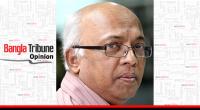 While President Donald Trump says Republicans defied history in the midterm elections by maintaining control of the Senate and winning a slew of Governor races, Democrats are celebrating their newfound majority in the House of Representatives. However, the 2018 midterms have shown that America is deeply divided. It is no longer traditional Red and Blue boundaries. Neither party can claim a clear advantage in the arithmetic that will decide who will be in the White House in 2020. This midterm election is also notable as it sets the stage for what appears to be a different kind of second half of Trump's term in office. And there could be consequences for his foreign policies.
While President Donald Trump says Republicans defied history in the midterm elections by maintaining control of the Senate and winning a slew of Governor races, Democrats are celebrating their newfound majority in the House of Representatives. However, the 2018 midterms have shown that America is deeply divided. It is no longer traditional Red and Blue boundaries. Neither party can claim a clear advantage in the arithmetic that will decide who will be in the White House in 2020. This midterm election is also notable as it sets the stage for what appears to be a different kind of second half of Trump's term in office. And there could be consequences for his foreign policies.
The Democrats should have more power to influence decisions on issues relating to Russia, Saudi Arabia to the Israel-Palestine situation. With their control of the House of Representatives, the Democrats now have much more power to investigate. Are we going to see more investigations into Trump’s possible ties to Russia?
For sure, we’re going to see more investigations. We’re going to see requests for classified or private material like bank and tax details and things of that nature which the committee’s intelligence and other committees in the House have the authority to ask for without necessarily seeking Senate approval. There will definitely be probing going on now or the next month as people try to figure out what’s the most effective way to push back against the many things that Trump has done that the Democrats don’t like. But not to push too far, as then such efforts might trigger a counter-reaction both in the Congress and also among the public.
Case in point: in the foreign policy arena, Russia, Syria, Iran, Yemen and the fallout of the Khashoggi situation will be on the agenda; the question is what they’re going to prioritise. Arab-Israeli issues will be pretty minor right now, but they’ll eventually emerge later.
Let’s then broaden out this discussion. On Saudi Arabia, we know that Trump is very close to the regime but with growing outrage over the murder of Jamal Khashoggi and with Democrats in control of the House, is that relationship going to be affected?
The relationship with Saudi Arabia is probably a great example of the two competing aspects of the president’s foreign policy decision-making. At one level, members of his administration who work on foreign policy matters, like Secretary of State Mike Pompeo and National Security Adviser John Bolton; they’re certainly going to be spending much more time on the Capitol Hill testifying before Congressional Committees, explaining the president’s decisions. So, in that sense it’s going to be a lot more oversight, it’s going to be a lot more pressure coming down on them, to confront the challenges such as the murder of Jamal Khashoggi and many other inconsistent aspects of the United States’ relationship with the Saudi Arabia extending to the war in Yemen. There’s a large scale opposition within the Democratic Party to the US’s ongoing role in Yemen, it’s helping to facilitate the Saudi campaign through refuelling as well as arms sales.
Trump's ability to get anything through this Democrat-controlled Congress is going to be severely hampered and foreign policy might be one of the few areas where he can act or provide distractions, something he’s not above doing as he showed with the migrants trying to fan racist fears about the caravan coming up through Mexico. It’s quite possible he’ll double down on the relationship with Saudi Arabia and the backing of Crown Prince Mohammad bin Salman also known as MBS.
Moving forward, now that the US is re-imposing sanctions against Iran where does this relationship goes? There have been so many reports in the past year suggesting that Trump wants to reopen negotiations with Iran. Will it happen?
Observers would find it extremely unlikely because there’s one actor in the mid-term election that we haven’t really given any attention to and the media in general. And, that’s the Republican Party’s biggest donor- Sheldon Adelson alongside his wife Miriam Adelson. They put over $100 million into this election cycle. One could argue that it was a blunder and it was a huge loss for them because of the outcome for the House. But, they gained ground in the Senate and I strongly argue that actually their investment into Republican House races still could pay rich dividends. Because their number one concern is foreign policy: it’s in favour of keeping a hawkish stance towards Iran as they’re very close with Israeli Prime Minister Benjamin Netanyahu.
And, by all accounts that is their primary motivation for their political donations –maintaining a close relationship between the Republican Party in the US and the Likud Party in Israel. Admittedly, Sheldon Adelson arguably has more influence on the Republican Party. This party is deeply indebted to him. Any Republican member of Congress or Senate and Trump himself, all owe arguably their positions to the largesse of the Adelsons in helping to fund them. Now, Adelson has proposed in the past that the US negotiating strategy toward Iran should be first to drop a nuclear bomb in as he put it in the Iranian desert and tell the Iranians that the next one will be landing on Tehran. This is not somebody who wants to see any sort of negotiation or diplomacy. He helped fund the opposition to the negotiation of Joint Comprehensive Plan of Action (JCPOA), popularly known as Iran Nuclear Deal, under the previous administration. He has played a major role in pushing for John Bolton thorough Iran hawks; nobody would doubt his determination to ignite a conflict as being appointed as national security advisor to Trump.
The point is, spending hundred million dollars in the election is not just an investment on the outcome of that particular election but it is buying continuing influence with that party.
Finally, one further observation to close this argument, it is possible that the Democrats in the House will completely ignore Saudi intervention in Yemen because they might decide they will get more attention focusing on the Russia investigation and some of Trump’s financial dealings or his past sexual harassment issues. They might decide they can only focus on so many things. Maybe they’ll drop some of those and spend more time on Saudi Arabia and Yemen. However, it remains to be seen.
Md. Sharif Hasan teaches International Relations at the University of Rajshahi.
 Opinion
Opinion
30847 hour(s) 31 minute(s) ago ;
Morning 02:25 ; Wednesday ; Apr 24, 2024
Will US midterm results affect Trump’s foreign policy?
Send
Md. Sharif Hasan
Published : 17:44, Nov 12, 2018 | Updated : 18:58, Feb 06, 2019
Published : 17:44, Nov 12, 2018 | Updated : 18:58, Feb 06, 2019
0 ...0 ...
/ab/zmi/
Topics: Md. Sharif Hasan
***The opinions, beliefs and viewpoints expressed in this article are those of the author and do not reflect the opinions and views of Bangla Tribune.
- KOICA donates medical supplies to BSMMU
- 5 more flights to take back British nationals to London
- Covid19: Rajarbagh, Mohammadpur worst affected
- Momen joins UN solidarity song over COVID-19 combat
- Covid-19: OIC to hold special meeting
- WFP begins food distribution in Cox’s Bazar
- WFP begins food distribution in Cox’s Bazar
- 290 return home to Australia
- Third charter flight for US citizens to return home
- Dhaka proposes to postpone D8 Summit
Unauthorized use of news, image, information, etc published by Bangla Tribune is punishable by copyright law. Appropriate legal steps will be taken by the management against any person or body that infringes those laws.
Bangla Tribune is one of the most revered online newspapers in Bangladesh, due to its reputation of neutral coverage and incisive analysis.
F R Tower, 8/C Panthapath, Shukrabad, Dhaka-1207 | Phone: 58151324; 58151326, Fax: 58151329 | Mob: 01730794527, 01730794528


